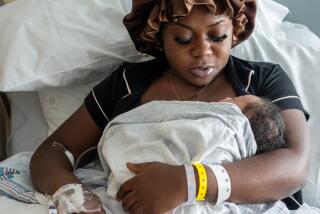Birth Troubles Far Likelier in 40s, Study Says
- Share via
A new study billed as the most extensive analysis of pregnancy and birth outcomes among women 40 and older suggests that medical complications and interventions during delivery are more prevalent than previously believed.
The most significant finding, the researchers said, was that women who first gave birth in their 40s were twice as likely to have a caesarean section as were first-time mothers in their 20s.
Forty-seven percent of the first-time mothers in their 40s had a caesarean section. That exceeds the 35% rate for that age group cited in previous studies and is more than double the 22% national average for women of all ages.
In the study of 24,032 California women in their 40s who gave birth in 1992 and 1993, the rates of pregnancy-related diabetes and high blood pressure also were substantially higher than in a comparison group of 625,525 women in their 20s who had children.
The work is being published today in the journal Obstetrics & Gynecology.
One of the largest differences between the older and younger mothers was in gestational diabetes, a serious complication of pregnancy that affected about 7% of the older mothers, regardless of whether the baby was their first. That rate was about four times higher than that of the younger mothers.
“This is the first time accurate numbers can be attributed to some of the complications of labor and pregnancy” for the older women, said the study’s lead author, Dr. William Gilbert of the UC Davis School of Medicine.
In addition, the new research found that labor was somewhat more difficult and more prolonged for the older women than the younger ones, and their babies were more likely to be born prematurely or be underweight, the study found.
But despite such added risks, the researchers strongly cautioned that the study results should not deter women in their 40s who want to have children.
“The take-home message is that while a lot of complications of labor and pregnancy are increased [for women in their 40s], the vast majority of them do perfectly fine,” said Gilbert.
Susheela Singh, director of research at the Alan Guttmacher Institute in New York, a think tank for reproductive issues, said earlier studies may have underestimated birth and pregnancy complications for older women because they included women in their 30s.
Because this new study is “based on a larger, better drawn sample of women, it is more convincing than other studies,” she said. The findings should help doctors anticipate and prevent some problems and also prepare women for the higher likelihood of medical interventions, she said.
Beyond that, the findings shed light on an American trend, showing that instances of women giving birth in their 40s are perhaps less common than suggested by popular culture’s many references to the phenomenon: Births to women in their 40s represented just 2% of the total in the years studied, though that was twice the level of a decade earlier.
Of the women having a first child in their 40s, a disproportionate 64% were categorized as white, while 17% were Asian, 14% Hispanic and 4% black.
The researchers, from UC Davis and the firm Health Information Solutions in Redwood City, based their analysis on hospital records and birth certificate data collected in a state-sponsored program called the California Health Information for Policy Project.
Taking the 1.2 million women who gave birth in the state in those two years, the researchers identified women in their 20s and 40s, and further split those groups into first-time and repeat mothers.
Overall, the older mothers had more complications than the younger ones, and the differences between the two age groups were greatest for first-timers.
Among women in their 40s, the caesarean section rate for first-time mothers was half again as much as the 30% rate for those having at least their second child. Among twentysomethings, the rates were 23% and 18%, respectively.
Researchers said the higher C-section rate reflects the greater number of pregnancy complications the older mothers face, and thus would be considered appropriate.
At the same time, Gilbert said, that rate may also simply reflect the extra caution with which such women and their doctors approach delayed births.
Some of the most dramatic differences between the older and younger women related to very rare conditions and thus should be no cause for added worry, the researchers said. For instance, a particular abnormality of the placenta was 10 times more common among the older women--but that still affected just one in 1,000 of them.
(BEGIN TEXT OF INFOBOX / INFOGRAPHIC)
Higher Birth Risks for Older Mothers
In an unusually extensive study of 24,032 women age 40 and over who gave birth in California, many complications of pregnancy and labor were more common than in a group of women in their 20s. Below are highlights of the findings for first-time mothers in the two age groups.
*--*
% of women % of women Complications older than 40 age 20-29 Caesarean section 47 23 Abnormal fetal position (including breech) 11 6 Abnormal labor (including insufficient contractions) 16 11 Prolonged labor 4 3 Pregnancy-related hypertension 5 3 Gestational diabetes 7 2 Premature birth 14 9
*--*
Source: Dr. William Gilbert and others, Obstetrics & Gynecology






